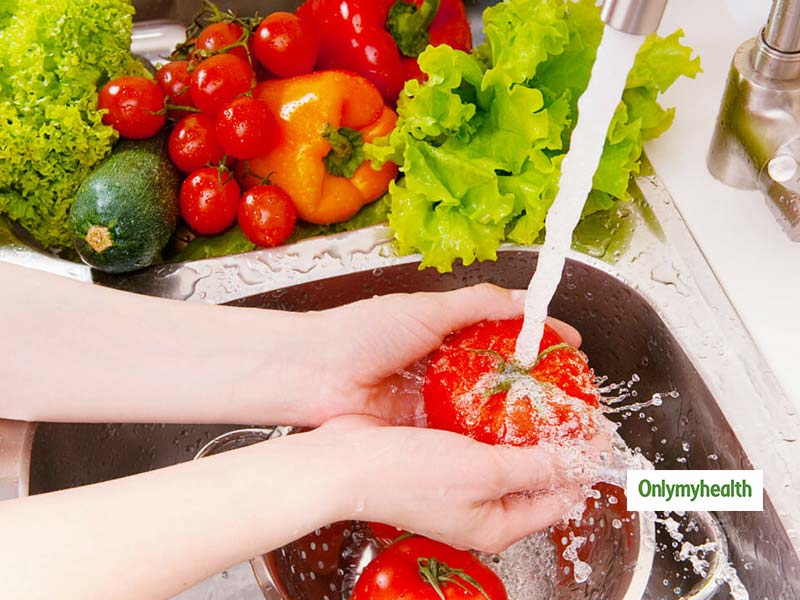
COVID-19 infection prevention and control guidance: FSSAI shares guidelines for the cleaning of fruits and vegetables! Since the initial days into the spread of COVID-19, health authorities and experts have been asking people to maintain cleanliness on all objects, surfaces around them and be very cautious, especially with food items. Now, the FSSAI (Food Safety and Standards Authority of India) has shared some guidelines for the proper cleaning of fruits and vegetables to prevent the spread of COVID-19 through them. However, there is no certainty yet about whether the deadly virus can be transferred via food articles or not. So, let’s see how we should clean our products to remove not just germs like viruses and bacteria but also chemicals like pesticides and insecticides.
Recently, in a Twitter post, the official handle of FSSAI shared a five-tip graphic to guide people on how they should wash their vegetables and fruits to maintain their safety.
Follow these simple tips to keep your fruits and vegetables clean.#EatRightIndia #HealthForAll #SwasthaBharat pic.twitter.com/8f3vyuQhP4
— FSSAI (@fssaiindia) June 29, 2020
- As per FSSAI, one should keep the vegetables and fruits in an isolated corner of the house (in the packaging itself for some time).
- People should wash the vegetables thoroughly with lukewarm water. Consumers can also put a drop of chlorine (50-ppm) in warm water and dip the products in the solution.
- The plants and fruits should be cleaned using drinking or potable water.
- Consumers should be conscientious and should avoid using disinfectants, soaps or cleaning wipes to wash the products.
- According to FSSAI, the fruits and vegetables that need to be kept in the refrigerator should be stored there, and other products should be kept at room temperature in baskets or racks.
Also Read: How To Sterilize And Clean Homemade Face Masks For Reuse
- If damage or bruising occurs on the food before eating or handling, cut away the damaged or bruised areas before preparing or eating.
- When the product needs to be peeled, rinse produce before peeling it, so dirt and bacteria aren’t transferred from the knife onto the fresh fruit or vegetable.
- Gently rub food while holding under plain running water. Avoid the use of soap or a produce wash.
#IndiaFightsCorona:
— #IndiaFightsCorona (@COVIDNewsByMIB) June 27, 2020
��Things to do if you have mild cough, cold or fever ��
▶️#StayAtHome
▶️Wear a mask
▶️Wash hands
▶️Call helpline number & follow instructions
▶️Maintain #PhysicalDistancing
▶️Don't share personal items
Via @mygovindia pic.twitter.com/KGNXmYzOx6
- Dry the food with a soft clean muslin cloth or paper towel to further reduce bacteria that may be present.
- For leafy vegetables, soak in a bowl of warm water with 1 tsp baking soda or 1/4th cup vinegar to remove pesticides.
- Do not store un-washed produce with other foods and wait for the time of cooking to wash. Wash before storing the fruit in the refrigerator.

Also Read: Drink Ayurvedic ‘Ayush Kwath’ To Boost Immunity, Know How To Prepare
Due to the current pandemic, there is a rise in awareness about hygiene. Understandably, people are keen on being able to wash and clean their fruits and vegetables thoroughly. For this purpose, one must try and consume the product with the skin intact whenever possible.
Here are some tips to keep in mind once you reach home after shopping.#SwasthaBharat #HealthForAll pic.twitter.com/qC6CIofhKg
— FSSAI (@fssaiindia) June 27, 2020
- FSSAI had asked consumers not to leave or store their food items outside the house (in the cars or the garage), as it could cause issues like exposure to pests or temperature abuse.
- The food packaging must be disinfected or sanitised using alcohol-based solutions, or with water and soap, FSSAI said.
- The platform and the sink used for the washing of fruits and vegetables must be cleaned. It should be ensured that nothing falls or drips onto the floor from the platform, and if it does, one must wipe it immediately.
(Medically reviewed by Dt. Shikha Mahajan, Holistic Nutritionist and founder of Diet Podium)
Read More in Miscellaneous
How we keep this article up to date:
We work with experts and keep a close eye on the latest in health and wellness. Whenever there is a new research or helpful information, we update our articles with accurate and useful advice.
Current Version